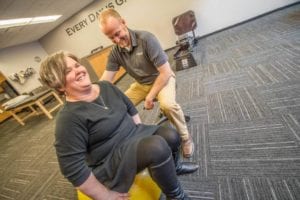Do you ever suffer from dizziness, lightheadedness, or get a spinning sensation (also known as vertigo) that affects your balance? If so, you are not alone. It has been found that up to 30% of adults are affected by dizziness and/or vertigo, which can affect your balance and ultimately can lead to falls.
Components of Balance
There are three components/systems that make up your balance system. The first one is your vision. We use our eyes to help us to see where we are walking and going and to help us make sure we do not run into things that are in front of us. You can decrease the use of vision for balance by making the room darker or if you have vision issues. The second component is called your proprioception system, also known as your ability to feel the ground with your feet. Your proprioception system can be decreased by walking on uneven surfaces, as this makes it harder for you to “feel” where you are walking or standing. The third component of balance is your vestibular system or your inner ear. The inner ear communicates with your brain to tell it how your body and head are moving in space and in relation to gravity. Because it tells the brain how your head is moving, it also helps to coordinate your eye movements when your head moves.
What causes dizziness or imbalance?
There are many systems that can be involved when you get dizziness or a loss of balance. For your inner ear, there are many ways that it can get damaged or become dysfunctional. One way could be from a trauma, like falling and hitting your head, getting a concussion, being in a car accident, etc. You also can get damage from an infection in your inner ear. There also can be inner ear disorders, including benign paroxysmal positional vertigo, which is described below. Lastly, dizziness can come from issues/disorders in other systems in your body, including diabetes, heart conditions, stroke or other brain conditions, low blood pressure, or even medications.
Common inner ear diagnoses
One of the most common inner ear disorders is benign paroxysmal positional vertigo or BPPV, affecting at least 9 out of every 100 older adults. This is when the crystals in your inner ear become loose and can move freely through the tiny tubes in your inner ear. When the crystal(s) moves, it creates vertigo or spinning sensation. Another inner ear disorder could be after a trauma or infection, and your inner ear does not work as well on one side as the other. When this happens, your two inner ears are not in sync and can create dizziness or feelings of imbalance.
How can PT help?
A physical therapist trained in vestibular rehabilitation can examine, assess, and treat a patient who has dizziness/imbalance to determine what systems/structures are involved and provide appropriate interventions to improve these symptoms. For instance, with BPPV, the physical therapist can perform specific examination and intervention maneuvers to determine where the crystal is misplaced/moving and help get it back in place, so it is no longer moving or causing dizziness. For other inner ear disorders, a physical therapist can examine and evaluate the cause of your dizziness and your risk for falling. After that, the physical therapist will work with you to develop a treatment plan that will address your dizziness and the activities that you have difficulty with because of your dizziness and imbalance. The core of what the physical therapist will do for you is to help your three components of balance work more efficiently, so you have improved balance and an overall decreased fall risk. The physical therapist will also address any strength, flexibility, or pain issues that you may have.
Where can you find a vestibular physical therapist?
Makovicka Physical Therapy has clinicians who have had extra training in vestibular rehabilitation, located at many of our clinics; call any of our clinics to talk with our experts today!
References:
https://www.choosept.com/symptomsconditionsdetail/physical-therapy-guide-to-inner-ear-trauma
https://www.choosept.com/symptomsconditionsdetail/physical-therapy-guide-to-dizziness

